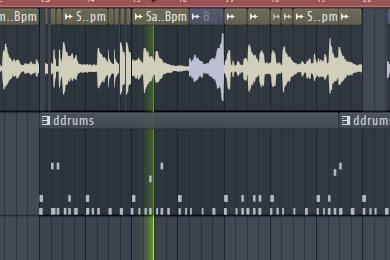Have you heard another music producer say, “using melodic loops is cheating”? Maybe you’ve just downloaded a new sample pack and started using one of their melodic loops and have wondered to yourself, is this cheating?
No, it is not cheating to use samples or melodic loops when producing music. Using a sample is like using a tool to produce the music you want. To go even further it is similar to collaborating with another artist! Many of the largest names in hip-hop have used melodic loops or have sampled other songs to create their hits.
In this article, I will answer common questions when it comes to using samples/melodic loops when producing music.
Why Is Using Samples Not Cheating?
It is not considered cheating to use samples as they are tools for a music producer to use to create new music. Samples can be chopped, triggered, filtered, pitched, used as peak controllers, and many more applications. Cheating implies someone is breaking a rule, which is not the case here.
Give 100 producers the same sample and you’ll get 100 different songs.
A really great example is a beat battle Decap hosted. He provided one sample that had to be used in the beat and the rest was up to the music producers. He got 149 entries and each one of them was completely different! Click here to listen to the entries.
There are so many ways a sample can be used that it can be viewed as an extended melodic hit. Instead of a single sound, it is a melody.
Another view that can be taken is that using a sample is like you’re collaborating with another artist. If two artists got together, one person made a chord progression with a great melody and the other put drums over top of it, did the person laying the drums down cheat?
Similarly, when a band is creating a song together, one person may bring a chord progression or guitar lick to the other bandmates and then create a song based on that chord/lick. This is similar to using a melodic loop as well!
Many companies release sample packs with the hopes their loops are flipped to create a new hit single! This benefits both parties as the producer and artist create a new hit song and the company that released the loops can now use that for marketing their sample packs.
Still not convinced?
Take the classic Johann Pachelbel, Canon In D chord progression: D A Bm F♯m G D G A. This chord progression is used in so many songs – too many to list! They all ‘sampled’ the same chord progression just flipped in different ways. Did the guitarist cheat when they copied the chord progression?
Why Is Using Samples Considered Cheating?
Utilizing samples and loops is considered cheating to some because you are not creating an original piece of music and/or that it takes fewer skills to flip a sample than create your own.
First, this is simply not true.
Hip-hop itself was created from sampling tracks, beats, and bassline from older records.
Like I mentioned above, give 100 producers one sample and you’ll get 100 different songs, which proves that using samples and loops does create original music. Additionally, sampling older records bring those classic songs to a new generation.
You may love a hit from the 1970s but someone born in 2007 is may never hear it or even enjoy it. Flipping the chorus or the ‘best part of the song will bring it to a fresh audience so the original song can live on.
Hip hop is simultaneously a new and old phenomenon; the importance of sampling tracks, beats, and basslines from old records to the art form means that much of the culture has revolved around the idea of updating classic recordings.
To say that flipping samples takes no skill is also untrue.
Sure you can take a sample and do nothing to it, but my interpretation of that sample will be different than yours. I may go with a LOFI approach while you go EDM!
Even knowing what to do with a sample can be a challenge!
To flip, chop, and utilize a sample is a skill in itself that has to be developed and practiced, much like creating melodies and chord progressions.
Is It Better To Create Your Own Melodic Loops?
It is neither better nor worst to create your own melodic loops as it depends on your goal. Melodic loops are tools to assist in producing a song, but if your goal is to learn how to create progressions or melodies, it may slow your progress down.
If your goal is to learn how to create chord progressions and melodies, using a melodic loop may not be beneficial since it is taking care of most of the work you’re trying to focus on.
Using a loop is like asking your piano friend to lay down a piano track for you to use!
If your goal is to create a song, using a loop is another tool, much like choosing an 808 or kick drum from a sample pack.
Do Famous Artists Use Samples?
Yes, many artists use samples and loops in their music. From the bedroom warriors to big names like Kayne West, Snoop Dogg, and Trippie Redd. In many hit songs, you’ll hear samples taken from other songs or melodic loops taken from sample packs.
Kayne West is a prime example of sampling music and flipping it to create something that is completely different! WhoSampled.com states that Kayne West has over 600 samples used in his songs! From Gold Digger to N*gg*rs In Paris.
Trippie Redd’s song, Miss The Rage, is based on a loop from Cymatics (free) sample pack, Odyssey. The loop used in the song is called Future Bass Drop Loop 7. The producer did slight adjustments and chops to it to create the song!
Artists cannot simply sample a song and release it under their own name. The artist must seek permission to use the sample from the company or person that holds the rights to the song. Otherwise, not only will their song be taken down they risk legal action against them.
Artists that do use samples in music either need to use a sample from a sample pack that has a royalty-free license or to retrieve a licensing agreement from the company/person that holds the rights to the original song.
Many sample packs are released with a royalty-free license meaning you can create a song using their samples and release it without having to pay any royalties.
Summary
Producing music using samples or loops is not cheating it is simply another method to produce music. Samples and loops are tools, like a drum kit or guitar, that allow us to create and explore new creative directions.
Hip-hop itself was based on the sampling of old records, beats, bassline, and melodic features and continues to follow this trend to this day. Instead of only having records available we now have companies and people who release sample packs that can be used in the same way.
In the end, don’t concern yourself with whether or not someone considers using samples is cheating. Create your music how you want to create it. And if you’ve never tried using a sample, try it!

